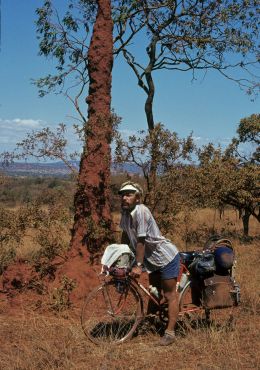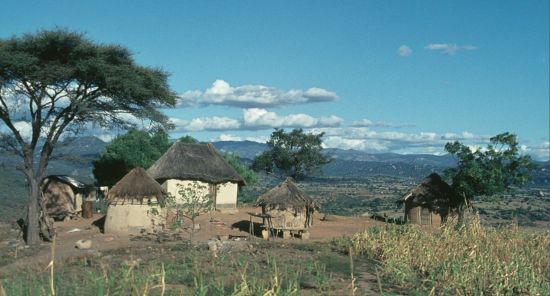| Barelds - Cycling around the world - Cycle stories - Asia, Africa, Europe, America | ||||||||||||||||||||
| home | site map | world | children | recent | cooking | dutch | german | react | ||||||||||||
Eastern and Southern Africa 1973 (5).

Ethiopia: The air ducts of a termite mound can become meters high in the colour of the soil.
A marvellous experience to stand face to face with the wild animals, to observe one another, full of mutual amazement. Unfortunately, elephants did not deign to look at us, with this scarce vegetation they had their trunks more than filled with eating their daily raw food.
Life threatening? That still had to come. Back in the civilised world, we climbed up along the snow clad Mount Kenya, three enormous pineapples on the carrier, to replenish the long lacked vitamins, we came on asphalt before Nairobi, the capital.
As fast as the rickety vehicles could, the wheels askew of old age and overloaded, the busy traffic tore past us, in countless overtake stunts. A policeman stopped us when we entered the city. "Where do you come from?" "Aaaah from Holland on a "bicycle?" "Iiiii, , just go to the head office to get a medal: he shouted at us laughing.
"I don't believe that", said the slim Masai boy. He was standing behind a stall at a missionary post selling beautiful Masai decorations. He didn't wear them himself, wore a shirt and trousers, spoke English and gad his elongated earlobes swung around his ear. I walked to our panniers to stow away the artful necklace and got out the folder with pictures which we had received in Nairobi from home. We indicated: look here we are in Sudan, here at the pyramids, here at a mosque in Turkey and we browsed on, full of interest he looked. "Yes", he said laughing "Now I have to believe it".

Rhodesia (now Zimbawe): Also here they had made homelands for black Rhodesians on the worse pieces of land.
M
ost Masai are still traditional clothed in their red cloth and live a nomadic life with their cattle. Next to their herds very often peacefully large herds of zebras, antelopes or wildebeests are grazing. These feel safe there knowing that the Masai does not kill game and can defend themselves against the lions.Two proud, well built, slim warriors walked on the road, their hair modelled with red clay into a hood above their eyes, decorated with beads, knife and club in their hand. Henny stopped and asked if he could take a picture. The answer is already known to us: Masai do not want to be photographed. Since I are already in the mean time inconspicuous taking pictures with my camera, with which you look from the top into the camera, Henny persists a little and yes, the gentleman becomes angry and pulls his knife.
"Here, hold this" Henny shouts and he gives me his bicycle, in the mean time he takes the bicycle pump from it. With the pump high up in the air he steps threatening in the direction of the warrior, who in fear of the bearded savage, then flees into the bushes with fluttering loincloth.
| Start World around | South America | << Previous | Next page >> | |||
| Barelds on bicycle through the world - Cycling in Asia, Europe, Africa, America | ||||||